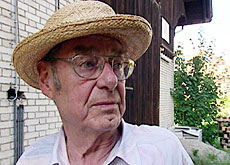Tragedy of child labourers comes to light

The story of tens of thousands of Swiss children who were sold or given away as cheap labour is slowly coming to light.
Although many of these child workers were beaten and even sexually abused, the practice was allowed to continue throughout Switzerland until the 1950s.
“It’s a very sad chapter in Switzerland’s history and it’s astonishing it wasn’t talked about until very recently,” says Peter Neumann, a filmmaker who has made a documentary on the subject.
The trade in “Verdingkinder”, or “discarded children”, first took root during the early 19th century when poor families and unmarried or divorced mothers would hand over their children to local authorities.
The children were then given to farmers and sometimes to factory owners, who received a fee in exchange for providing them with food and shelter.
Public auctions for the child workers were still being held in some Swiss towns and villages as late as the 1930s.
“It’s astonishing that these slave auctions were allowed to happen in Switzerland,” says Swiss historian, Marco Leuenberger. “One explanation is that Switzerland was a poor agricultural country at the time and there was a dire need for cheap labour.”
Slave labour
These discarded children were meant to work in exchange for a modest wage – but all too often the work was akin to slave labour, as Turi Honegger, a former Verdingkind, recalls.
“It’s very painful for me to think back to those times,” says Honegger. “My life consisted of working and sleeping. There was little food and everyone shunned me.
“I remember feeling invisible, like I didn’t exist. I ate and slept under the stairs, well away from the family dinner table. I was shunned by all of them, and there was no one who could help me escape.”
Honegger, an 80-year-old retired journalist who grew up as an orphan, winces when he recalls the beatings he received from the farmer for whom he worked.
“Everyone would just turn away when he hit me,” he says.
Beatings
“Once he beat me so badly that his wife took pity, cleaned up my wounds and put me to bed. But in his anger the farmer dragged me out and hurled me into the stables. He kept me locked up for days and told me to eat the animal feed.”
Honegger, who was 14 when he was taken away from his adopted family, is one of only a few surviving discarded children willing to speak openly about their childhood experiences.
For many, the memories are too traumatic, says Neumann.
“I found that many former discarded children still haven’t come to terms with their experiences,” Neumann explains. “For some, the memories of being physically and sexually abused run too deep and they still feel somehow ashamed about their past.”
Leuenberger, the historian, believes many children were scarred for life by their experiences.
“Many ex-Verdingkinder weren’t able to lead a normal life when they grew up. Statistics show that many became outcasts and turned to crime,” he told swissinfo.
Black brothers
The practice of giving away children was most widespread in German-speaking Switzerland, but also occurred in the western canton of Vaud. Many children from Italian-speaking canton Ticino, the so-called “Black Brothers”, were also sent over the border to work in Italy, mostly as chimney sweeps.
Historians believe that as many as 10,000 children were sold or given away every year, though no records exist before 1820. Leuenberger believes that in canton Bern alone as many as 6,000 children were forced to become labourers every year between 1850 and 1900.
Many of them were probably traded without the knowledge of local authorities, he says.
Neumann’s documentary is one of numerous films and publications to have come out in the past five years seeking to break the silence over this tragic chapter in Swiss history.
Inspired
Neumann was inspired to make his documentary film by his grandfather, himself a former Verdingkind.
“I was so touched by the stories of his gruelling childhood, and by the way he managed to put the past behind him and to build up a successful career, that I decided to do some research into this subject.”
But according to former Verdingkind Honegger, it was almost impossible to address the subject 20 years ago, when he published his first book about his childhood experiences.
“I remember my publisher telling me to cut chapters out, and to rewrite and tone down my account, because he thought no one would believe that this kind of thing happened in Switzerland. It was taboo to talk about it in public.”
Numerous historians have also been calling on the Swiss government to fund a nationwide project to research this chapter of national history.
“So far our call has fallen on deaf ears so we are looking for private sponsors to fund the research,” Leuenberger told swissinfo.
“As there are only some public facts and figures available, we are also calling on former Verdingkinder to come forward to give us their accounts.”
swissinfo, Vanessa Mock
Tens of thousands of “Verdingkinder” (discarded children) were given away as cheap labour from the early 1800s until the 1950s in Switzerland.
Historians believe as many as 12,000 children were given away during the 1930s alone.
The trade in child labour was managed by local authorities, some of which even held public auctions for the child workers.
Verdingkinder were mostly the orphaned children of unmarried or divorced mothers and poor families.
Farmers received a maintenance fee from local authorities to provide food and shelter for the children.
But in practice, many children were malnourished and overworked. Some were beaten or even sexually abused by their host families.

In compliance with the JTI standards
More: SWI swissinfo.ch certified by the Journalism Trust Initiative


You can find an overview of ongoing debates with our journalists here. Please join us!
If you want to start a conversation about a topic raised in this article or want to report factual errors, email us at english@swissinfo.ch.